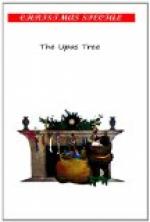“Helen, there is one instrument, above all others, which I have always longed to play; yet I have never even held one in my hand.”
“What instrument is that, darling?”
“The violoncello,” said Ronnie, sitting up and turning towards her as he spoke. “When I think of a ’cello I seem as if I know exactly how it would feel to hold it between my knees, press my fingers up and down the yielding strings, and draw the bow across them. Helen—if I had a ’cello here to-night, you would listen to sounds of such exquisite throbbing beauty, that you would forget everything in this world, my wife, excepting that I love you.”
His eyes shone in the firelight. An older look of deeper strength and of fuller manly vigour came into his face. The glow of love transfigured it.
With an uncontrollable sob, Helen stooped and laid her lips on his.
The clock struck midnight.
“Oh, Ronnie,” she said; “oh, Ronnie! It is to-day, now! No longer to-morrow—but to-day!”
He sprang to his feet, took her hand, and drew her to the door.
“Come, Helen,” he said.
Part II
CHAPTER V
THE INFANT OF PRAGUE
Two men, in a flat at Leipzig, sat on either side of a tall porcelain stove.
The small door in the stove stood open, letting a ruddy glow shine from within, a poor substitute for the open fires blazing merrily in England on this chill November evening; yet giving visible evidence of the heat contained within those cool-looking blue and white embossed tiles.
The room itself was a curious mixture of the taste of the Leipzig landlady, who owned and had furnished it, and of the Englishman studying music, who was its temporary tenant.
The high-backed sofa, upholstered in red velvet, stood stiffly against the wall, awaiting the “guest of honour,” who never arrived. It served, however, as a resting-place for a violin, and a pile of music; while, on the opposite side of the room, partly eclipsing a fancy picture of Goethe, stood a chamber organ, open, and displaying a long row of varied stops.
Books and music were piled upon every available flat space, saving the table; upon which lay the remains of supper.
Of the three easy chairs placed in a semi-circle near the stove, two were occupied; but against the empty chair in the centre, its dark brown polished surface reflecting the glow of the fire, leaned a beautiful old violoncello. The metal point of its foot made a slight dent in the parquet floor.
The younger of the two men sat well forward, elbows on knees, eyes alight with excitement, intently gazing at the ’cello.
The other lay back in his chair, his thin sensitive fingers carefully placed tip to tip, his deep-set eyes scrutinising his companion. When he spoke his voice was calm and deliberate, his manner exceedingly quiet. His method of conversation was of the kind which drew out the full confidence of others, while at the same time carefully insinuating, rather than frankly expressing, ideas of his own.




